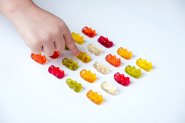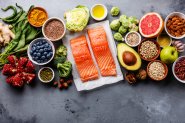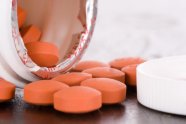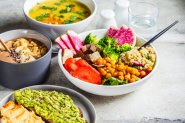Advertising Disclosure
10 foods that seem healthy but totally aren’t
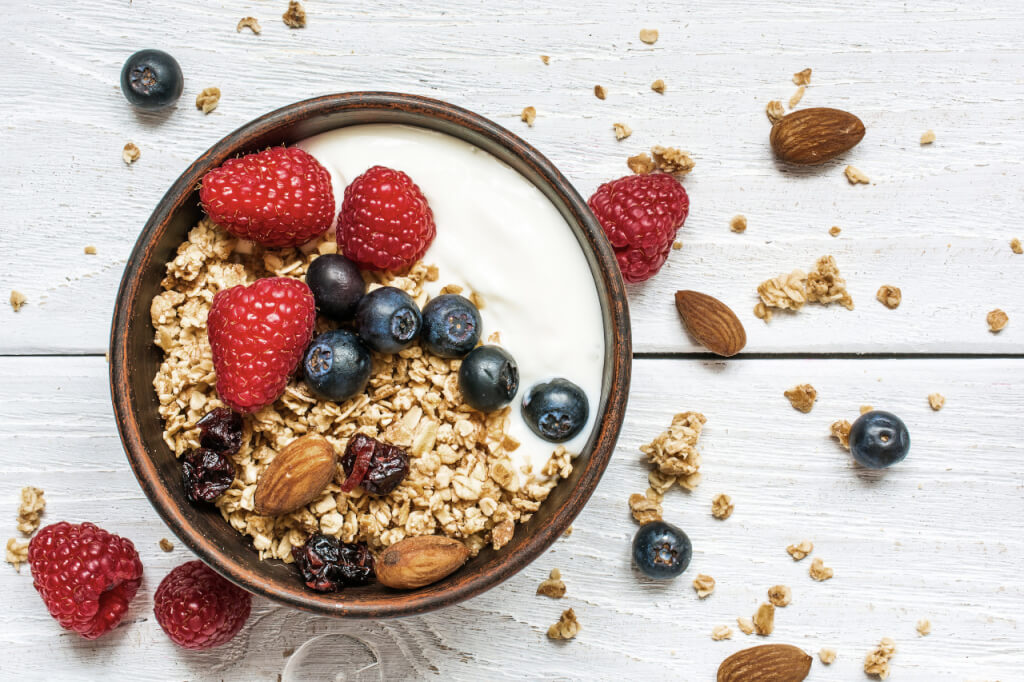
Eating healthy is easier than it sounds. Food labels can be misleading, and tricky advertising has created a long list of foods that seem healthy but aren’t really healthy. In fact, they can be seriously detrimental to your health. For example, brands have wiggle room to put labels such as “fat free” on their product, without it really having to be fat-free. This a universal problem that many people face when grocery shopping. According to a Nielson survey, 59% of consumers have trouble understanding nutrition labels. The truth is, your favorite healthy snack could be doing you more harm then good. Here are 10 foods that seem healthy but aren’t.
GRANOLA
Granola is the go-to healthy snack for many people. The oats, nuts and seeds fool consumers into believing granola is healthy. But the problem is most time the granola is covered and coated in sugar and baked in oil. Serving size is another unhealthy problem when it comes to granola. The serving size for granola is about 1/4 cup, which, if you’re like most people, you’re probably doubling or tripling in one sitting. This makes your sugar, carbohydrate and calorie intake increase by a lot.
PROTEIN/ENERGY BARS
Advertisers promote protein and energy bars as quick, healthy snacks. And from the outside looking in, it’s easy to believe they are. But the oats, nuts and dried fruit that make up protein bars can actually be counterproductive once you read the nutrition label. Belly-bloating soy, sodium, artificial colors, sugar and high fructose corn syrup are unhealthy ingredients that you can find in protein bars. High fructose corn syrup has been linked to weight gain, especially when you consume it on the daily.
SUSHI
While sushi isn’t the unhealthiest option, too much of it can be. The health factor depends on the type of sushi you are eating. If you’re sushi has a lot of rice and with soy sauce, “you’re getting lots of refined carbohydrate and sushi.” Sashimi, which is thinly sliced raw meat that is usually served without rice, is a healthier sushi option. Sashimi also includes important vitamins and nutrients like niacin, selenium, magnesium and vitamins B6 and B12.
FRUIT AND VEGETABLE JUICES
Fruit and vegetable juices sounds like health in a glass, but the truth is a lot of these juices are full of sugar. This is especially the case for juices chalk full of fruits. Grocey store juices typically have around 30 grams, or 7.5 teaspoons, of sugar in a single serving. Also, juices strip the fiber away from the fruits and vegetables, which is one of the most nutritious parts of these foods. Smoothies are a healthier alternative that doesn’t remove any fiber, and are more likely to fill you up.
DIET SODA
The name within itself makes diet soda seems like a healthy alternative to regular soda, but many study’s show that diet soda may actually be worse for your health. This is because of the large amount of artificial sweeteners in diet soda. What many don’t know is, artificial sweeteners are much sweeter than the real deal. According to a Purdue University study, artificial sweeteners will trick your body into thinking you’re eating real food, which causes “a spike in insulin sent to regulate your levels,” that becomes stored fat.
YOGURT
You often read that yogurt is great for weight loss and gut health because it is a natural probiotic. While this is true, not all types of yogurt are healthy. Flavored yogurt can include “potentially-carcinogenic” artificial colors, not to mention a ton of sugar. Frozen yogurt is also seen as a healthy alternative to ice cream but they really aren’t all that different. It includes high amounts of sugar, and any “health” benefit is usually overtaken by the toppings that are often times placed on the yogurt. Plain low-fat Greek yogurt is the healthiest yogurt option out there. You can add your own fresh fruit for flavor.
DRIED FRUIT
Dried fruit may seem like a healthy snack, but it is actually full of sugar. On top of the high amounts of sugar, dried fruit includes sulfur which is what keeps it persevered. The drying process also sucks out certain nutrients from the fruit. You are truly better off eating some fresh fruit instead, as the dried option contains at least three times the amount of calories.
VEGGIE BURGERS
As more vegetarian options are available to us, veggie burgers have only grown more popular. One issue is veggie patties are often low in protein, compared to a meat patty. According to registered dietician nutritionist Dawn Jackson Blantera, a lot of the frozen veggie burger include less actual vegetables, and more filler ingredients, which create that “real burger” texture. When shopping for veggie patties, pick the options with vegetable listed first in the ingredients.
PREPARED SALADS
If you’re eating out, prepared salads usually seem like the healthiest choice on the menu. This is actually very misleading because prepared salads can sometimes be less healthy than a burger. A kale salad from Panera has 600 calories and 40g of sugar, making it less healthy and a cheeseburger from Five Guys. Dressing and toppings will lower the salads healthiness by a ton. These additives can spike the calories in your salad and increase the grams of fat.
REDUCED FAT PEANUT BUTTER
Peanut butter is already a healthy choice because it is full of good fats called monounsaturated fats. Reduced fat peanut butter does not contain these fats, but still contains the same amount of sugar and calories as its regular form. “Reduced fats” foods also tend to add more sugar to make up for the lack of fat. Stick with normal peanut butter to reap its health benefits instead of consuming empty calories with the reduced option.
